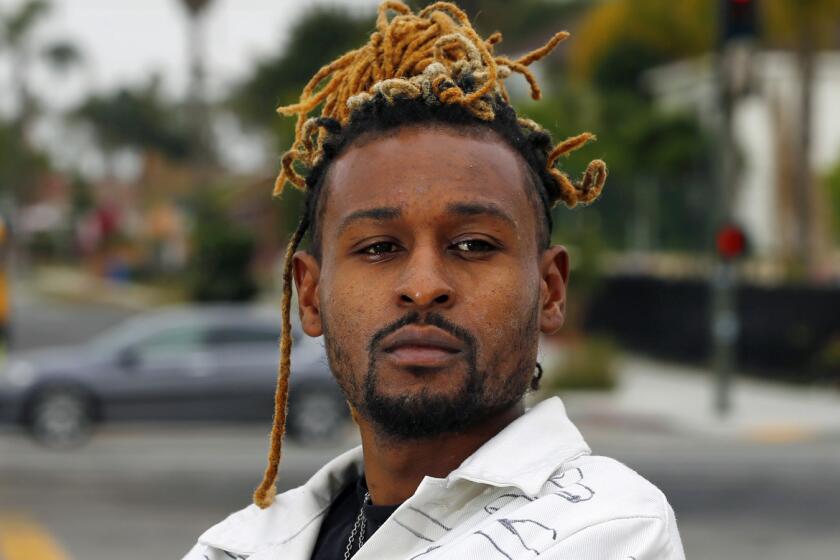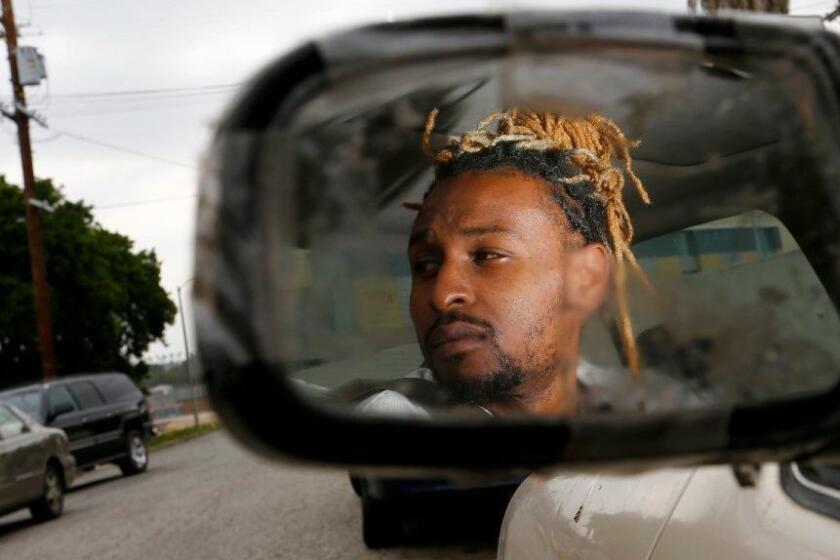California bars police from using LAPD records in gang database. Critics want it axed
SACRAMENTO — As a scandal over false and inaccurate gang identifications by Los Angeles police officers widens, California’s top cop on Tuesday stopped law enforcement agencies around the state from using department records included in a controversial statewide database.
On Tuesday, California Atty. Gen. Xavier Becerra announced he had “revoked access to CalGang records generated by the Los Angeles Police Department (LAPD),” and suggested the state Legislature should consider more reforms to the troubled system — which Becerra was charged with overseeing beginning in 2018.
The ban affects about a quarter of the records in the secretive database, which contains names and personal information of about 80,000 people, mostly Black and brown men, whom law enforcement suspects of being involved in or associated with gangs.
But police reform advocates said Becerra’s action did not go far enough toward fixing what they contend is an unfair roster, plagued by past problems, and open to wider abuses.
“It is probable that most departments using CalGang have the exact same problems that LAPD does,” said Sean Garcia-Leys, a lawyer who has represented clients throughout the state who have protested their inclusion in CalGang. “The database should be shut down.”
A spokesman for the attorney general did not respond on the record about what further legislative actions Becerra would recommend, or why his agency was retaining the LAPD records.
“I’ve said it before and I’ll say it again: CalGang is only as good as the data that is put into it,” said Becerra in a statement. “It should now be obvious to everyone: CalGang must change.”
As calls for police reforms have intensified in the wake of George Floyd’s killing in Minneapolis, criminal justice advocates have pushed Becerra to put a state moratorium on use of the system, citing the attorney general’s slowness to create new regulations meant to curtail abuses.
Nearly three years ago, the Legislature gave the Department of Justice authority to revamp the database. DOJ regulations were expected in January, but they are still pending. The attorney general asked for a six-month extension, and delays from the coronavirus have pushed the rules even further out.
In 2016, a state audit found that CalGang was riddled with questionable entries and errors such as the inclusion of children as young as 1, and that people were added based on subjective criteria such as the neighborhood where police encountered them or the color of clothes they were wearing. Critics said those loose rules were open to abuse, but the accuracy of CalGang has been hard to determine because its contents are off-limits to civilians.
Becerra’s announcement comes months after allegations first arose that LAPD officers were submitting false information about alleged gang affiliations of people they pulled over, and days after Dist. Atty. Jackie Lacey announced prosecutors in her office had filed criminal charges against three LAPD officers for allegedly doing so knowingly.
On Tuesday, LAPD Chief Michel Moore presented an audit of the police department’s use of the gang database to the city’s civilian Police Commission, which found widespread inconsistencies in how officers were using the database and gathering information on subjects.
The review found LAPD’s entries into CalGang to be “inconsistent, unreliable and unpredictable, and as such will, at the very least, be perceived of as unfair and untrustworthy.”
The department’s “haphazard” use of the database in general, as the audit described it, was in addition to the more serious and willful misuses alleged by Lacey’s office — the scope of which are still not fully known. In addition to the three officers who have been charged, another 21 remain under investigation, according to police.
The charged officers, Braxton Shaw, Michael Coblentz and Nicolas Martinez, face a 59-count indictment that includes conspiracy to obstruct justice and multiple counts of filing a false police report and preparing false documentary evidence.
Criminal justice reform advocates are asking California’s top law enforcement officer to stop using a gang identification system that has been long on problems and slow on fixes.
They are members of the elite Metro LAPD unit, which has repeatedly come under scrutiny for its tactics.
Moore on Tuesday told the commission that the department would halt use of the database altogether. The audit report he shared suggested the department would access it only to remove individuals or assist in investigations of officers who allegedly misused it.
Critics of the system said problems like those uncovered by the LAPD scandal mean residents are harassed and unfairly criminalized, hurt their ability to find housing and employment and taint any future interactions they have with law enforcement in the state.
False allegations in the database can also harm an individual’s immigration status, reform advocates say.
Garcia-Leys said he has represented multiple clients who contend they were unfairly added to CalGang by law enforcement agencies around the state.
Law enforcement has argued that their expertise in identifying gang members should be trusted, and the database is a valuable tool for investigating organized criminal networks that can operate between jurisdictions. Tuesday, Moore acknowledged that gang violence remained a problem, but said the department would look for new ways to address it.
Brian Allen was driving home from work in July 2017 when he spotted someone from his days at Crenshaw High School.
“In the instances of gang violence in our neighborhoods, it still has a tremendous impact on communities, particularly communities of color, and our ability to investigate those crimes and identify those responsible is important,” Moore said.
But for agencies outside the LAPD, the system will continue to function under its old rules, despite the freeze on LAPD records.
“It’s obviously abundantly clear now that this has been abused,” said Sammy Nunez, a criminal justice advocate in Stockton who served on the committee charged with helping to draft new CalGang regulations. “We can no longer continue to cast such a broad net.”
Los Angeles Times reporters Leila Miller and Ben Poston contributed to this report.
More to Read
Sign up for Essential California
The most important California stories and recommendations in your inbox every morning.
You may occasionally receive promotional content from the Los Angeles Times.















